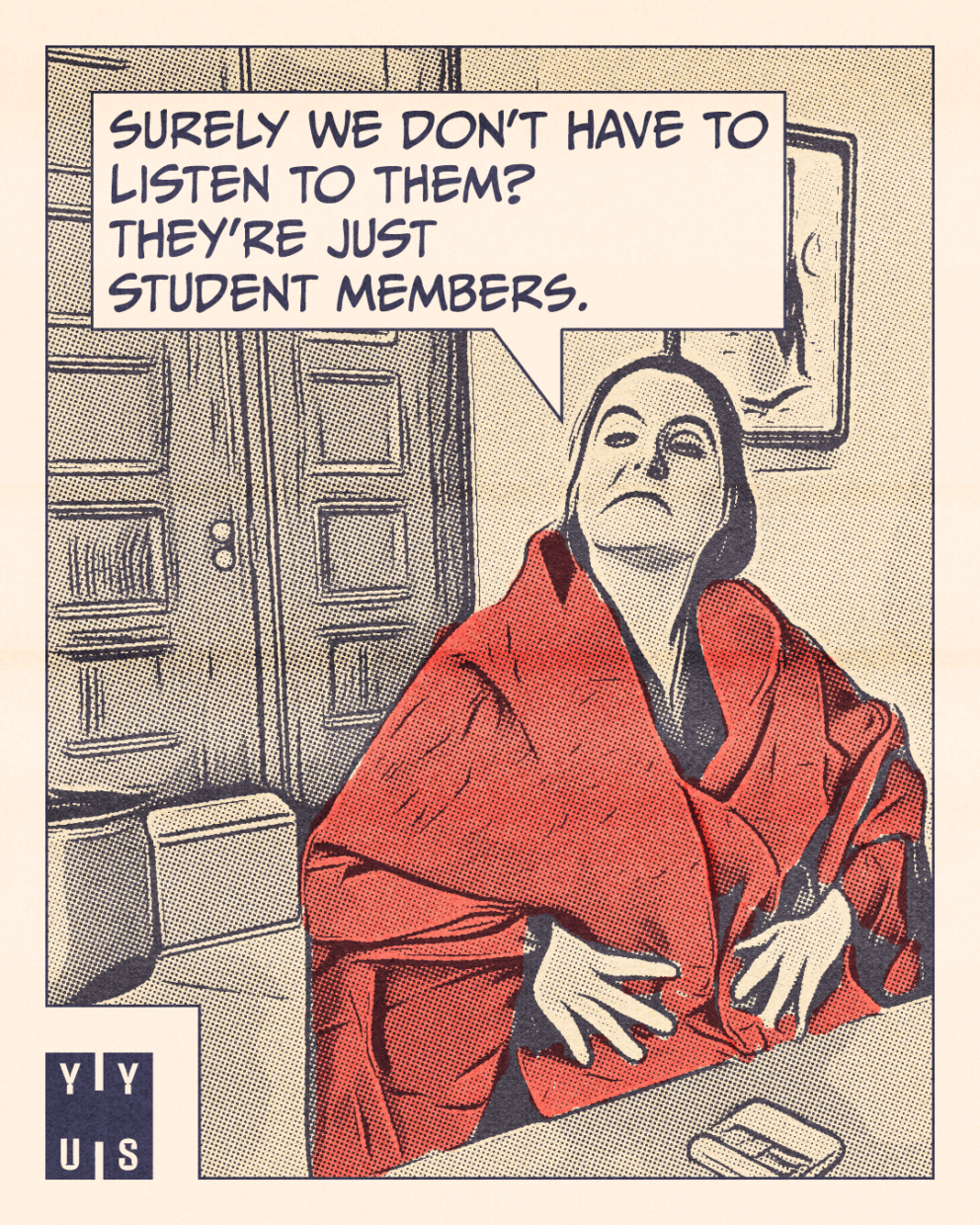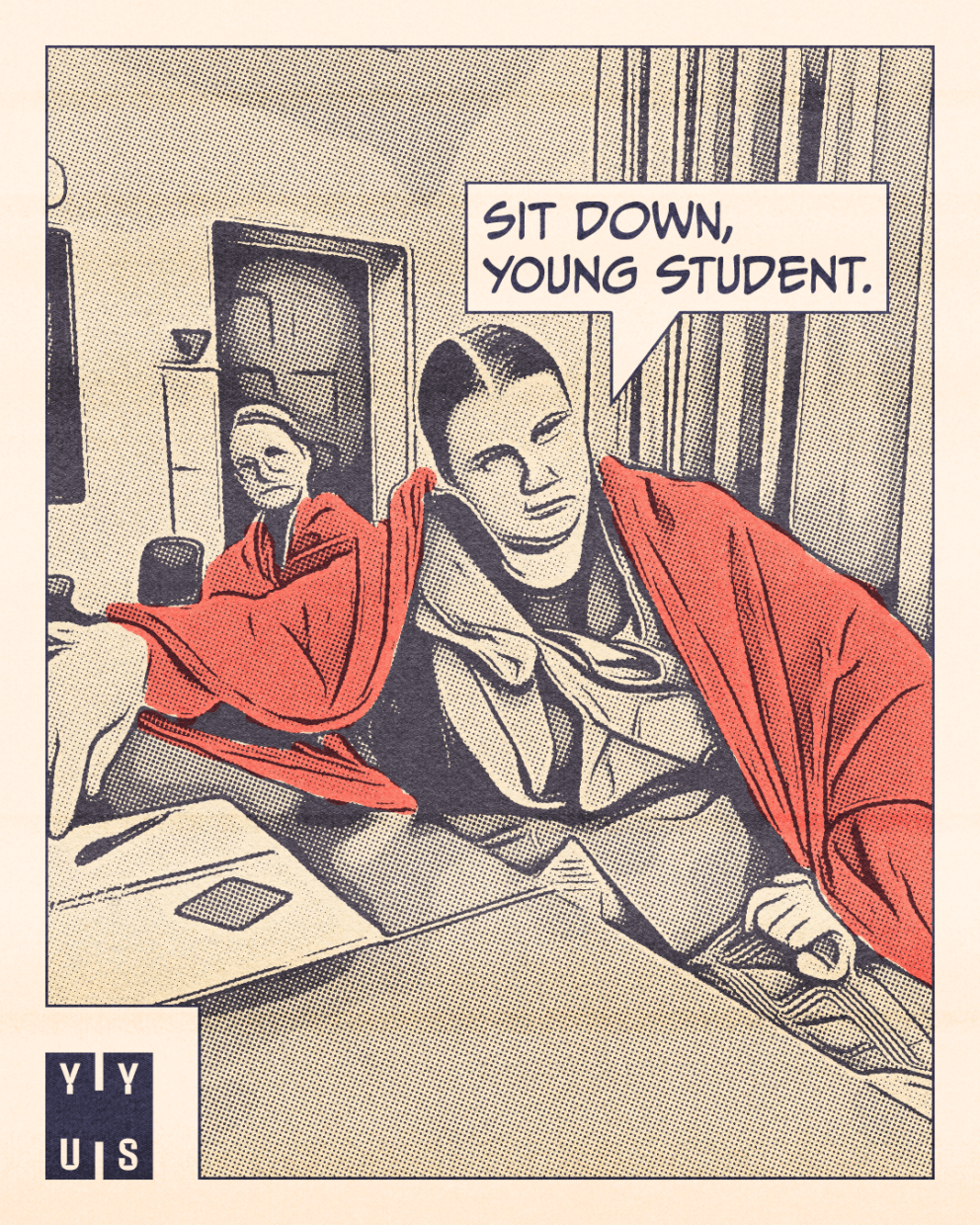
Open positions: faculty councils
On faculty councils, you will get to influence the future direction of your faculty! This autumn, we are looking for student representatives for the faculty councils of all faculties for the term 1 January 2026–31 December 2027.
One of the faculty councils’ duties is developing teaching and research in the entire faculty. As a student representative, you will thus get to influence what the everyday life of students in your faculty looks like both now and in the future.
The faculty councils’ duties also include the following:
- Overseeing quality management over research and teaching
- Deciding on issues such as degree requirements, teaching schedules and student admissions criteria
- Processing any far-reaching plans and other important matters of principle at the faculty
In addition to students, members of the faculty councils include professors and other staff members at the faculty. Student representatives on faculty councils are paid a meeting fee of 35 euros.

Open positions: University Collegium
The entire University is represented on the University Collegium. This autumn, we are looking for student representatives for the University Collegium for the term 1 January 2026–31 December 2027. We are looking for representatives from all faculties as well as the Swedish School of Social Science.
As a student representative on the University Collegium, you will get to influence the future direction of the entire University. The University Collegium meets at least twice a year to discuss matters concerning the University. The collegium’s duties include the following:
- Appointing members from outside the University community to the University Board
- Confirming the members representing the University community to the University Board
- Appointing the Chancellor of the University and the university auditors
- Confirming the University’s financial statements and annual report
In addition to students, members of the collegium include professors and other staff members at the University. As a student representative on the collegium, you could even serve as the chair of the entire collegium, accumulating important experience that will help with your career, for instance. Student representatives on the collegium are paid a meeting fee of 65 euros.
How to apply to become a student representative
-
-
Check out the open positions
The most important information on each position for student representatives is included in the relevant call for applications. First read the call for applications in the Halloped application system, check out the ‘Student representatives’ guide and, if needed, ask for further information from our specialist in charge of student representatives.
-
-
-
Do not hesitate to submit an application
Read the call for applications carefully and reflect on the things it mentions as advantages when writing your application. The application does not need to be long, though, and you do not need to have prior experience of similar duties. The Halloped system will send you a confirmation message of having received your application, and after this, it is just a matter of waiting for further information. One of HYY’s employees will contact you after the application period has ended to tell you how the process continues. Remember to send your application early enough, as we generally cannot consider late applications! The application period is open 11 September–9 October 2025.
If you are drawing a blank on what to write in your application, check out our model applications for the faculty councils and the collegium!
-
-
-
Wait for further information on how the application process continues
After the application period for student representatives has closed in the autumn, the selection committees established for each faculty will begin processing the applications and making selection proposals on student representatives to be selected. The selection committees may request additional information if they wish. Possible dates for the requests for additional information can be seen on the form for each position in the Halloped system.
You will be informed how the application process is progressing at different stages of the process. Of course, you can also contact the specialist in charge of HYY’s student representatives or HYY’s selection coordinator directly if you have any questions related to the application process or to serving as a student representative!
-
-
-
Join our activities and training sessions!
A training event will be organised for all student representatives on faculty councils and the University Collegium to provide you with orientation to the position and an opportunity to meet the other student representatives. You will also get to join HYY’s Student Representative Network and Study Network, where you will be able to discuss topical matters and network with other student advocates and representatives at the University. In addition to this, we use HYY’s email lists for student representatives to inform you about current issues.
-
-
-
Model application
Check the sample application for inspiration what to write in your own application! The sample is provided later.
-

How are the student representatives selected?
The method of selecting student representatives is laid down in a regulation approved by HYY’s Representative Council. The Central Selection Committee established by the Representative Council plans and prepares the application periods as well as establishes selection committees for each faculty to process the applications.
The selection committees make justified proposals on the individuals to be selected, and the Student Union’s Board or Representative Council then approves the proposals.
-
-
Selection committee?
We are looking for members for the selection committees 25 August–10 September, that is, before the actual calls for applications for student representatives. We are looking for at least three members from each faculty for the selection committees. The members must be registered for attendance at the faculty the selection committee represents.
The main duty of the selection committees is to process the applications for the positions of student representatives in its faculty and to prepare proposals on the applicants to be selected. In the selection committee, you will thus get to ensure that the most motivated applicants are selected to represent students in the University’s decision-making processes! You will also gain valuable experience of recruitment and administration that will help you with your career, for instance.
The selection committee’s work includes a maximum of two meetings as well as a collective training event that lasts a few hours. The training event will be held on 8 October 2025. Serving on the selection committee is thus a great opportunity to get to make decisions affecting the student community without making a long-term commitment! The selection committees are also always supported by one of HYY’s employees who will prepare the material, serve as the secretary and help during the meetings.
Applications to the selection committees should be submitted through the Halloped system.
-
Frequently asked questions
-
You will learn many useful skills in the position of student representative, ranging from being able to grasp the big picture to project management and group work. The position will also help you get to know University personnel from professors to educational coordinators. A meeting fee is paid for the meetings of faculty councils and the University Collegium, and you can also get credits for serving as a student representative.
Every year, HYY provides student representatives with free training on issues such as communication, influencing and meeting technique. The Student Representative Network provides you with not only peer support but also friends.
You can apply for a certificate of having served as a student representative from HYY and, under certain conditions, credits from the University. You will need the certificate granted by HYY when applying for credits! You can apply for the certificate by sending email to HYY’s document secretary.
-
As a student representative, you must commit yourself to your duties and attend the meetings of your administrative body. Faculty councils meet around once a month during academic terms. The meetings last around 1–2 hours. The University Collegium’s meetings usually last around two hours. The collegium meets less frequently than once a month.
In addition to the meetings themselves, preparing for the meetings by going through the meeting material, for instance, will also take some time. Thoroughly reading the meeting material before the meeting, asking for the opinions of – depending on the situation – either your fellow students or subject organisation on the issues on the meeting agenda and speaking up at the meeting itself are quite enough to be successful in the position.
Usually, vice members can also participate in the meetings. It is a good idea to check whether this is the case at the beginning of each term. In any case, always decide among yourselves who is going to attend the meeting to ensure that the meetings always have student representation!
-
Exchange plans do not necessarily prevent you from being selected. However, we generally hope that student representatives could commit to their duties for as large a part of their term as possible.
-
You will never be working alone as a student representative! Each faculty council and the University Collegium has other student representatives who you will be closely cooperating with. Right at the beginning of your term, we recommend creating a shared group for the student representatives and vice representatives to make it easier for you to agree on who is attending the meetings and prepare for the meetings together.
You will also get peer support from other student representatives through the Student Representative Network maintained by HYY. We also organise training events for student representatives and persons in charge of study affairs. We will inform you of any training events by email and through our social media channels. You can also always contact HYY’s specialists in educational policy, whether you are facing a challenging situation or simply want to ask us about something related to studies!
-
You must be registered for attendance at the faculty whose student representative you are applying to become. In addition to this, when applying to a faculty council or the University Collegium, you may only be employed by the University if your working hours are a maximum of 50 per cent of normal working hours and your contract lasts a maximum of 6 months.
Motivation, understanding of current affairs at the faculty or the University, contacts with subject and faculty organisations and previous experience of student advocacy work are considered as advantages. However, previous experience is not a requirement! Detailed application instructions and criteria can be found in the Halloped application system under each position open for applications.
-
Student representatives on faculty councils, the collegium and the University Board may only be employed by the University if their working hours are a maximum of 50 per cent of normal working hours and their contract lasts a maximum of 6 months. Working at the University does not prevent you from serving as a student representative in the steering groups of degree programmes.
The effects of being employed by the University are defined in more detail in the University’s Electoral Regulations. You can also ask for further information about these effects from HYY’s specialist in charge of student representatives.
-
Applications for the positions of student representatives on faculty councils and the University Collegium that are open this autumn will be processed by faculty-specific selection committees. The selection committees have the best understanding of the current affairs and needs at their faculties. The selection committees make justified proposals on the individuals to be selected. The final decisions on the selections will be made by the Student Union’s Board in the case of the faculty councils and by HYY’s Representative Council in the case of the University Collegium.
During supplementary calls for applications, the selection proposals and justification memorandums will be made and the matter presented to the administrative body making the final decision by HYY’s specialist in educational policy.
The method of selecting student representatives is laid down in a regulation approved by our Representative Council.
-
Faculty councils meet around once a month during academic terms. The meetings last around two hours. The number of matters addressed at the faculty councils’ meetings may be fairly high at times and quite low at other times. The meetings have more preprepared matters that just need a quick decision at the meeting than the meetings of the University Collegium, for instance. This means that the meetings do not necessarily include all that much discussion, with the main focus being on reading the meeting material before the meeting. We recommend going through the material, that is, the agenda and its attachments, together with the other student representatives. You can also always contact HYY’s specialists in educational policy.
The duties of faculty councils include overseeing quality management over research and teaching, deciding on issues such as degree requirements, teaching schedules and student admissions criteria and processing any far-reaching plans and other important matters of principle at the faculty. Faculty councils also decide on the faculty’s finances, appoint the dean and vice dean and award the degrees completed in the faculty.
-
There are a few meetings per academic year. The number of meetings is much lower than that of the steering groups of degree programmes, for instance. The meetings last around two hours. A lot of time in them is allocated for discussion, the exchange of ideas and, if needed, voting. The collegium may also get together to discuss matters outside the meetings. The theme of such meetings may be, for instance, the University’s direction in general.
The entire University is represented on the University Collegium. The collegium consists of professors, staff members and, of course, students, a total of 48 members. Its main duties include appointing members from outside the University community to the University Board as well as appointing the University’s chancellor and auditors. The collegium also confirms the University’s financial statements and annual report.